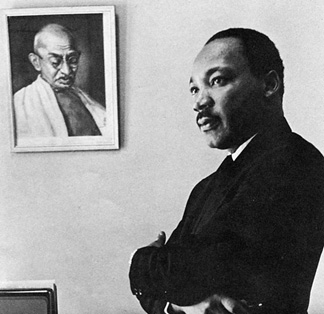In commemoration of Martin Luther King Jr. Day, UNMC Today will feature a series of photos and quotations from the civil rights leader. In today’s excerpt, King talks about nonviolent resistance.
The series will culminate Jan. 20 at noon with a presentation by Diane Ariza, Ph.D., assistant dean of multicultural affairs at Albion College in Albion, Mich., and former director of multicultural affairs at the University of Nebraska at Omaha. Free pizza and soda will be available for the first 300 guests at the Storz Pavilion. A live videotape presentation of Dr. Ariza’s presentation will be available for overflow audience members at the Wittson Hall Amphitheater. A sign language interpreter will be present to translate for audience members who are deaf or hearing impaired.
 “The alternative to violence is nonviolent resistance. This method was made famous in our generation by Mohandas K. Gandhi, who used it to free India from the domination of the British empire. Five points can be made for nonviolence as a method in bringing about better racial conditions. First, this is not a method for cowards; it does resist. This method is passive physically but strongly active spiritually; it is nonaggressive physically but dynamically aggressive spiritually.
“The alternative to violence is nonviolent resistance. This method was made famous in our generation by Mohandas K. Gandhi, who used it to free India from the domination of the British empire. Five points can be made for nonviolence as a method in bringing about better racial conditions. First, this is not a method for cowards; it does resist. This method is passive physically but strongly active spiritually; it is nonaggressive physically but dynamically aggressive spiritually.
A second point is that nonviolent resistance does not seek to defeat or humiliate the opponent, but to win his friendship and understanding.
A third characteristic of this method is that the attack is directed against forces of evil rather than against persons who are caught in those forces. It is evil we are seeking to defeat, not the personal victimized by evil.
A fourth point that must be brought out concerning nonviolent resistance is that it avoids not only external physical violence but also internal violence of spirit. To retaliate with hate and bitterness would do nothing but intensify the hate in the world.
Finally, the method of nonviolence is based on the conviction that the universe is on the side of justice. It is this deep faith in the future that causes the nonviolent resister to accept suffering without retaliation.”
Excerpt from “Nonviolence and Racial Justice,” article written by Dr. King for Christian Century magazine, February 1957 issue. Taken from A Testament of Hope: The Essential Writings of Martin Luther King, Jr., edited by James Melvin Washington (Harper & Row Publishers, 1986).
Photo from Martin Luther King Jr.: To the Mountaintop, by W.M. Roger Witherspoon, Doubleday Inc., 1985.